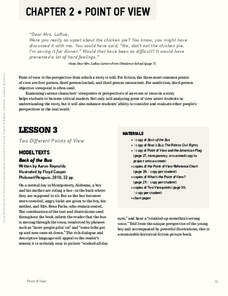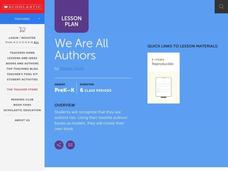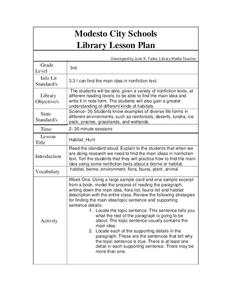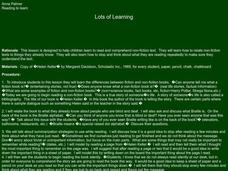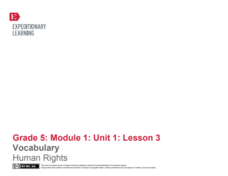Curated OER
Reintroduce: Main Idea
What would a main idea be without important details? Readers use a graphic organizer to record key details from an informational text (a fiction text would also work). Review main idea as a concept before beginning, asking scholars...
Curated OER
Introduce Vocabulary: Firefighters (Mitten)
Your budding readers know what it's like to get to a word and think, "What does that mean?" Expand their vocabulary in context using Christopher Mitten's nonfiction picture book Firefighters. Get them ready by pre-teaching the new...
Curated OER
Creating a Newspaper
Get the scoop with a fun, engaging newspaper project. After analyzing the parts of a newspaper, including the headline, subtitles, and pictures or images, young journalists get to work by writing their own stories in a newspaper article...
Curated OER
Introduce Vocabulary: Animal Tracks (Dorros)
What kind of animal made those tracks? Explore some wild vocabulary in context as learners listen to Arthur Dorros' book, Animal Tracks. Before your read this, introduce the new words like bother, dam, reed,...
Curated OER
Introduce Vocabulary: Dinosaur Bones (Barner)
Dig into some prehistoric vocabulary in Bob Barner's informative book Dinosaur Bones. This works best if you introduce the primitive words before reading the story. These are the focus terms in the text: ancient, climate, extinct,...
Curated OER
Introducing Vocabulary: Christopher Columbus (Weinberger)
The story of Christopher Columbus has fascinated young historians for centuries; use this vocabulary-in-context strategy to dive into Kimberly Weinberger's picture book about this classic explorer. Begin by introducing the new words:...
Curated OER
Butterfly, Butterfly: Teaching Vocabulary
Kindergarteners practice new words through listening to and reading the science book Butterfly by Jenny Feely. The teacher will first choose words that are essential for understanding the text. Then, using pictures in the text,...
Curated OER
Introduce Vocabulary: A Picture Book of Abe Lincoln (Adler)
The story of Abe Lincoln serves as the backdrop to this vocabulary-in-context activity as you read David Adler's A Picture Book of Abraham Lincoln. Scholars learn these politically themed words before listening to you read the story...
Scholastic
Point of View
The point of view in a story can dramatically change the story itself. Focus on finding the points of view in various reading passages with a language arts packet, which includes fiction and nonfiction text.
Curated OER
We Are All Authors
Read and discuss a variety of books by different authors and have your class create their own book. They will identify the different parts of a book, then using a story they have already written, they enter their story and information...
Curated OER
Ready-Set-Go-Whoa!
The Apaches: People of the Southwest offers readers a chance to employ the “Ready-Set-Go-Whoa!” strategy (an adaptation of the KWL) to test what they know and summarize what they learn as they read Jennifer Fleischner’s nonfiction...
Curated OER
Bias and Crime in Media
Critical thinking and social justice are central themes for this resource on bias and crime in media. The class views and discusses an incisive PSA that highlights assumptions based on race. Small groups read newspaper opinion pieces...
Curated OER
Fears and Phobias
Take the fear out of reading with this series of three lessons from HotWire Magazine about fears and phobias. Each lesson contains pre-reading and post-reading activities aimed at improving learners' reading comprehension skills with the...
Curated OER
Is It Fact or Opinion?
Distinguish between fact and opinions in this nonfiction reading lesson plan. Middle schoolers read 'The Diary of an Early American Boy' and work in groups to analyze the text. They record the facts and opinions for the text.
Curated OER
Rachel's Life is in a Hole
Explore how lack of access to water impacts peoples' lives in poor countries. Through text reading and discussion, middle schoolers are presented with the story of a young girl who lives and functions with limited water resources. They...
K20 LEARN
Writing An Argumentative Paragraph: Argumentative Writing
Learning how to craft a cogent argument based on a solid claim, supported with evidence and solid reasoning, is an important life skill. Teach middle schoolers about argumentative writing with a lesson asking them to analyze the claims,...
Curated OER
Habitat Hunt
Third graders read several nonfiction texts and practice finding the main idea for the text as well as learn about various habitats. In this main idea lesson, 3rd graders read several nonfiction texts and make habitat cards. Students...
Curated OER
Researching Animals Portrayed in Fables
Students research an animal used in fables. In this lesson on nonfiction texts, students use the Internet to find information about an animal to help them complete a Research Response Sheet.
Curated OER
Prepare to Read Nonfiction
Learners explore the components of a KWL chart as they examine the facts of a story about the Leaning Tower of Pisa. Vocabulary from additional stories is utilized to form antonyms and synonyms.
Curated OER
Reading to Learn
Children learn to read and comprehend non-fiction text and explore how to relate non-fiction texts to things they already know. They then examine how to stop and think about what they are reading repeatedly to make sure they understand...
EngageNY
Vocabulary: Human Rights
Your class continues to explore the history of the Universal Declaration of Human Rights. In addition to learning about the background of this text, learners work on the skill of identifying and understanding key academic vocabulary....
Media Smarts
Media Awareness Network: Hate or Debate?
Discuss the difference between legitimate debate on a political issue and arguments that are based on hate through a science-fiction scenario that shows how a controversial issue can be discussed in both ways. Then learn how purveyors of...
Curated OER
Abigail as Letter Writer
The fourth instructional activity in the series of 16 asks researchers to analyze an exchange of letters between John and Abigail Adams for what they each valued in letter writing.
Curated OER
The Best Main Idea
What is the main idea? Interest your young readers with this fun introductory lesson! After selecting several items from a paper bag, the teacher leads learners to determine the big idea for those items. This concept is then applied to...








